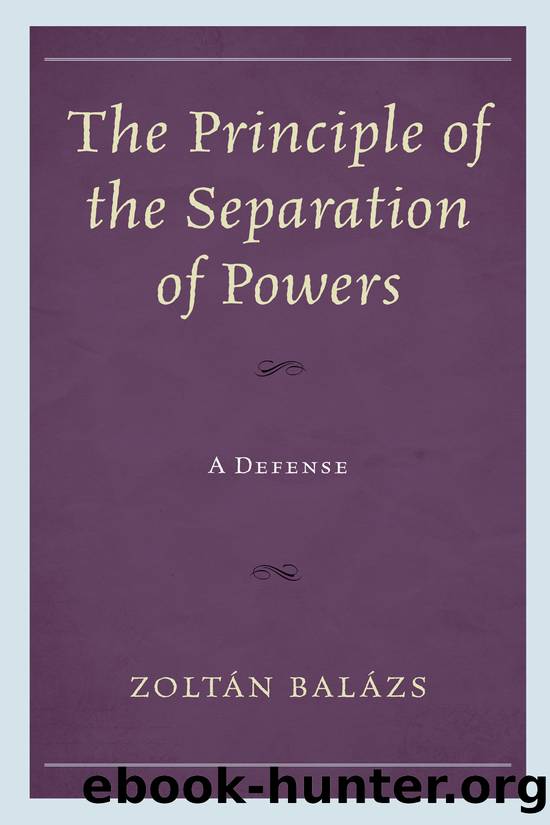The Principle of the Separation of Powers by Balázs Zoltán;

Author:Balázs, Zoltán;
Language: eng
Format: epub
Publisher: Lexington Books/Fortress Academic
Figure 4.1 The Conceptual Map of Order and Power. Source: Created by the author.43
Notes
1. Möllers makes a brief reference to the notion of power but without any serious reflection on it, he dismisses it as underdetermined, writing that â[i]t evades a more accurate description of the factors at workâ (The Three Branches, 80).
2. Hannah Arendt, On Violence (New York: Harcourt, Brace and World, 1970).
3. Michel Foucault, Power/KnowledgeâSelected Interviews and Other Writings, ed. Colin Gordon (Brighton: Harvester, 1980).
4. Weber, Economy and Society.
5. Talcott Parsons, âOn the concept of power.â Proceedings of the American Philosophical Society 107 (1963): 232â62.
6. Niklas Luhmann, Macht (Stuttgart: F. Enke Verlag, 1998).
7. James H. Read, âIs power zero-sum or variable-sum? Old arguments and new beginnings.â Journal of Political Power 1 (2012): 5â31.
8. John C. Harsanyi, âMeasurement of Social Power, Opportunity Costs and the Theory of Two-Person Bargaining Games.â Behavioral Science 7 (1962): 67â80 and Brian Barry, âPower: An Economic Analysis.â in Power and political theoryâsome European perspectives, ed. Brian Barry (London, New York: Wiley, 1976), 67â101.
9. Keith Dowding, âResources, power and systematic luck: A response to Barry,â Politics, Philosophy and Economics 2 (2003): 305â22.
10. Dahl, Power as the Control of Behavior; Steven Lukes, Power: A Radical View (London: Macmillan Press, 1974).
11. Andrew C. Schotter, The Economic Theory of Social Institutions (Cambridge: Cambridge University Press, 1981); Gauthier, Morals by Agreement.
12. Gauthier advanced an interpretation of Hobbes where the right of protection conceived as a fairly broad autonomy to advance individual interests is reconcilable with the Leviathanâs sovereignty: âHobbes must espouse an alienation social contract theory in order to defend absolute, permanent sovereignty. If the subjects merely loan their rights to the sovereign, then he is assured neither absolute nor permanent power. But an alienation social contract theory is not therefore incompatible with limited sovereignty. Indeed, if persons have the capacity to alienate certain of their rights in order better of further their interests by undertaking overriding commitments, then internal, moral restraints ... will do much of the work Hobbes assigns to external, political constraintsâ (Morals by Agreement, 151).
13. âThe Hobbesian state of nature is, after all, plainly and self-evidently replete with social interactions.â Peter T. Steinberger, âHobbes, Rousseau and the Modern Conception of the State.â The Journal of Politics 3 (2008): 596.
14. The idea of power being positively linked with freedom is a central theme of Philip Pettitâs republicanism. His key term is âantipower.â He identifies it with freedom in the positive sense, distinguishing it from the mere non-interventionalist (negative) concept of freedom while steering clear from any conception of positive freedom. Antipower is power, that is, a means to resist othersâ will. Since Pettitâs argument is clearly normative from the first step and is moved by a worry about powerless people and groups, he does not really note that what he calls antipower is massively present in modern society anyway. Whether it should be further promoted, especially by laws and governments, is another question. See Philip Pettit, âFreedom as Antipower,â Ethics (April 1996): 576â604.
15. Such views of the harm principle usually work with the more robust or thick concept of autonomy (see Raz 1986, Ch.
Download
This site does not store any files on its server. We only index and link to content provided by other sites. Please contact the content providers to delete copyright contents if any and email us, we'll remove relevant links or contents immediately.
Spell It Out by David Crystal(36110)
Life for Me Ain't Been No Crystal Stair by Susan Sheehan(35802)
Cecilia; Or, Memoirs of an Heiress — Volume 1 by Fanny Burney(32546)
Cecilia; Or, Memoirs of an Heiress — Volume 2 by Fanny Burney(31943)
Cecilia; Or, Memoirs of an Heiress — Volume 3 by Fanny Burney(31929)
The Great Music City by Andrea Baker(31916)
Professional Troublemaker by Luvvie Ajayi Jones(29651)
The Secret History by Donna Tartt(19052)
We're Going to Need More Wine by Gabrielle Union(19034)
Twilight of the Idols With the Antichrist and Ecce Homo by Friedrich Nietzsche(18622)
All the Missing Girls by Megan Miranda(15952)
Cat's cradle by Kurt Vonnegut(15334)
Pimp by Iceberg Slim(14488)
Bombshells: Glamour Girls of a Lifetime by Sullivan Steve(14056)
For the Love of Europe by Rick Steves(13905)
Talking to Strangers by Malcolm Gladwell(13347)
Norse Mythology by Gaiman Neil(13345)
Fifty Shades Freed by E L James(13232)
The Social Justice Warrior Handbook by Lisa De Pasquale(12187)
